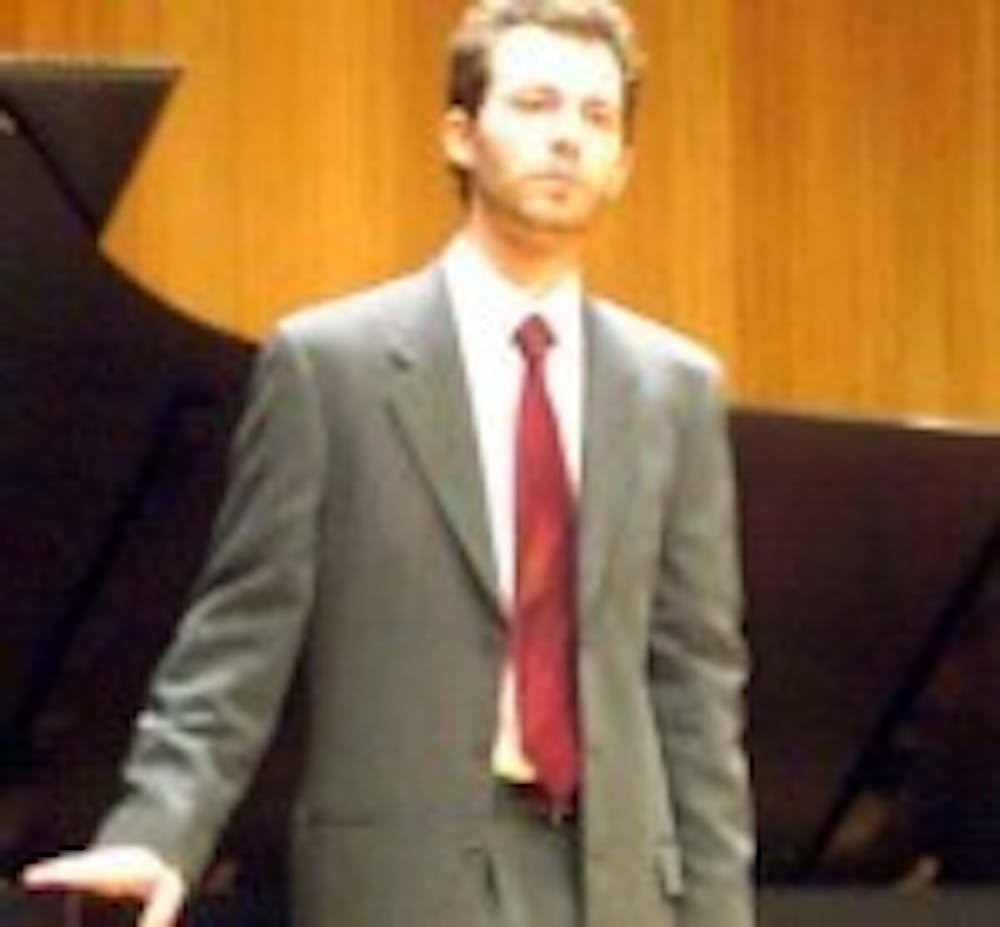For all 90 minutes of baritone Alexander Hurd's faculty recital in Slee Hall, not a single note was noticeably missed, not a word was forgotten, and not a single unpleasant sound was made. If his teaching skills are anything like his magnificent performing, students here at UB will have much to gain from Hurd.
Alternating gracefully between French, German, and English, Hurd showed off his qualifications at a faculty recital Thursday night at 8 p.m. in Lippes Concert Hall in Slee Hall. Professor Jacob Greenberg was the pianist. The recital was Hurd's first introduction to the university population in general, and he proved himself more than worthy of his new position as Assistant Professor of Music in Vocal Performance.
For his first recital as a faculty member here at UB, Hurd performed a wide variety of 20th century selections, including many songs by lesser-known composers. The mood ranged from heartbreakingly sad to whimsical and humorous, with a little bit of everything in between.
The recital opened with five pieces by French composer Maurice Ravel entitled "Natural Histories." The pieces were written as impressions of nature, with music reflecting the movements and temperaments of some unusual creatures, including crickets, swans, and guinea fowl. Ravel was a brilliant composer, and Hurd took advantage of that, showing the versatility of his upper register, control over dynamic contrasts, exceptionally clear diction, and good use of vibrato to bring life and expression to the songs.
The next two selections were both by Hanns Eisler, an Austrian composer who fled to the United States in 1942. The first piece, entitled "Three Grotesque Songs," was written in 1919. Eisler's absurd songs detail tree roots talking to each other, two bottles longing to be married, and a song going down a funnel, showing how insane the world must have seemed to a young man in post-World War I Europe. Hurd treats the songs well, using vocal and facial expressiveness to convince the audience of both the melodrama and the whimsicality of the music.
The second of the Eisler pieces was written in 1942, shortly after Eisler had fled to the United States to escape World War II. The piece, "Hollywood Elegies," is a collection of short songs about the dull practicalities of the Los Angeles area, set to music. Music that sounds like a cross between a Wagner opera and a piano bar is used to highlight the writers, greed, poverty, and angels that defined the city for Eisler.
Arnold Schoenberg, one of Eisler's teachers, was next on the concert program. Schoenberg is primarily known for developing atonal music based on the 12-tone series of notes, but the selections chosen for this recital were far from the strange, often harsh music that Schoenberg's name brings to mind.
The "Four Songs" were gentle, beautiful, reflective, and melodic renderings of the beauty and emotion of nature. The last song, "Forest Sunshine," was one of the best of the recital, with Hurd using his exceptional range and great diction to convey the gentle beauty of a walk in the woods, musing about lost loves, on a sunny day.
Following these uncharacteristically tame pieces of Schoenberg were some absolutely crazy works by two American composers, John Musto and William Bolcom. Musto's "Selected Songs" consisted of five poems that weren't initially set to music. The result is a collection of very unusual and emotionally moving songs.
"Heartbeats" was a rhythmic song based on a poem about AIDS, with lyrics like "Don't cry. Take charge. No sex. Eat right." This was followed by a eulogy, made beautifully peaceful and melancholy by Hurd, a song set to e. e. Cummings's "Witness," and a gorgeous piece called "Litany," based on a poem by Langston Hughes. The last of the songs was "Nude at the Piano," an over-the-top melodrama that is finally revealed to be about loneliness and rejection.
Cabaret songs served as a fitting end to the intriguing recital. The five songs by William Bolcom were humorous and entertaining works of storytelling, fit for a cabaret audience. Even at the end of the concert, Hurd was in full performance mode, conveying great energy, anguish, patience, satire, and mystery, expressing the lyrics wonderfully and putting on a great show.
The only complaint to be made about the recital is that it left the audience wanting more. While 20th century musical settings of poetry are a good beginning, it would have been nice to hear a wider range of works from Hurd. Though, if this concert is any indication, anticipation will be well rewarded, and Hurd will perform many more times for the UB audience.





